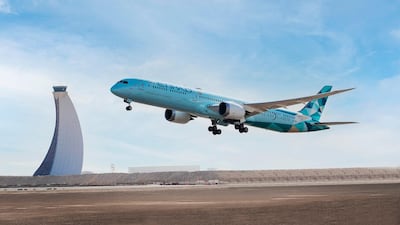Etihad Airways has completed its first eco-flight of 2021 with a Dreamliner service from Abu Dhabi to Rome.
The national airline of the UAE released details about the flight to coincide with Earth Day 2021.
Flight number EY83 departed Abu Dhabi for Italy on April 17, testing product enhancements to reduce single-use plastic, weight and result in more efficient flying.
The Boeing 787 fleet is part of the Etihad Greenliner programme. The airline has offset carbon dioxide emissions for the special liveried Dreamliner for the entire year, an amount of approximately 80,000 tonnes. This is the first carbon-offsetting programme in the region and means that all eco-flights operated as part of Etihad's testing programme will fly carbon-footprint free.
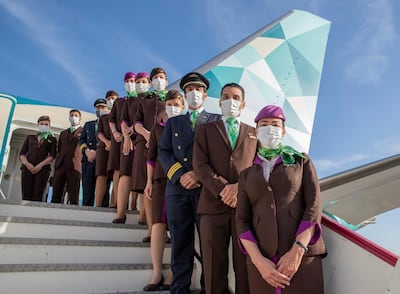
The first test flight of 2021 was operated with a fully vaccinated crew and all passengers on board had confirmed negative PCR test results.
Tony Douglas, chief executive at Etihad, explained that the airline wants to ramp up eco-testing this year.
"We are stepping up our efforts so eco-testing won’t be confined to quarterly dedicated ecoFlights, but instead be an always-on, ever-present part of operations to test, refine and implement sustainability initiatives."
Ditching single-use plastics
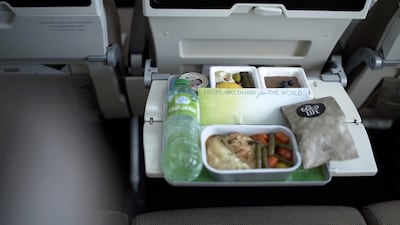
The Rome eco-flight featured the removal and replacement of 1,731 single-use plastic items from the on-board service. This comes after previous test flights to Brisbane and Brussels, in 2019 and 2020 respectively, removed or replaced a combined 2,682 single-use items.
Cutting down on single-use plastic products also helps with overall weight reduction, which in turn reduces CO2 emissions. On the flight to Italy, ditching these plastic goods resulted in a weight reduction of 108 kilograms, which equates to a saving of 60kg in carbon emissions.
Successful initiatives trialled on the latest eco-flight will be incorporated into regular scheduled operations in the future. Etihad's goal is to remove 80 per cent of single-use plastics from flights.
The airline also trialled improved waste reduction with a recycling initiative to manage cabin waste. Strict international regulations force airlines to incinerate all contaminated materials. Etihad has worked to find suppliers offering products that do not release harmful emissions in incineration, such as EcoWare bagasse pots, which are compostable and made from plants.
The test flight produced and successfully diverted 8.1kg of recyclable material from landfill.
Sourcing locally and sustainably
Etihad's eco-flight focused on replacing on-board products with locally produced, UAE-sourced sustainable alternatives.
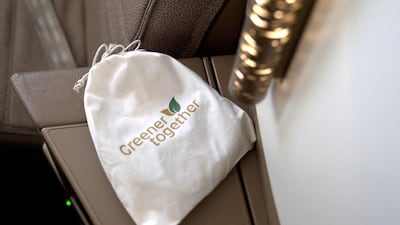
Al Ain Water's plant-based bottles were one of the new products on board. Abu Dhabi start-up The Concept was also part of the flight, with meals being served on the company's sustainable in-flight trays, which are made from used water bottles.
The airline also tested potable water optimisation, which resulted in a reduction of CO2 emissions by 189kg. Data from this flight will be used to help Etihad develop a more efficient method of calculating requirements for water on board in future operations.
Flying on a more efficient path
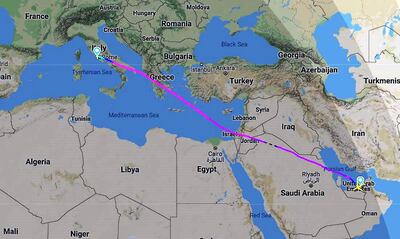
By following a more efficient flight path, the eco-flight successfully avoided 1,386kg of CO2 through operational efficiencies alone. Using Boeing's Probabilistic Flight Planning tool, the aircraft's flight path was designed to take advantage of optimised climb and continuous descent. If this tool was used on every flight, Etihad believes it would save the airline 2,000 tonnes of carbon emissions each year.
“Flight optimisation is one of the first places we should be looking to for fuel and CO2 savings as an industry," said Douglas. "It’s an elegant, simple solution for massive, incremental savings that would fundamentally change the industry and put us on the path to a sustainable future."
Electric tractors and engine foam
Moving freight and luggage on to the plane was another eco-efficient activity. The airline used all-electric vehicles to ferry items between the terminal at Abu Dhabi airport and the aircraft.
These electric tractors were successfully trialled on previous eco-flights and are permanently deployed to service 37 per cent of Etihad and other airlines's flights at Abu Dhabi airport. Etihad says this measure alone has saved 309.5 tonnes a year in CO2 emissions.
In February, Etihad announced a partnership with GE Aviation, licensing a new foam wash jet engine cleaning system. This system is set to remove more than 7,000 metric tonnes of CO2 in 2021 from Etihad’s GE90 and GEnx fleets.
On this test flight alone, the system saved 290kg of carbon dioxide emissions.
A greener future
Etihad's Greenliner programme is part of the airline's efforts to make flying more sustainable. The flight was the airline’s fourth test eco-flight as part of the initiative.
"Etihad made a significant and tangible commitment to sustainability and the future of aviation over a year ago, first when we launched the Greenliner programme in partnership with Boeing, GE and other aviation leaders, then with our commitment to achieving net zero emissions by 2050 and halving our net emission levels by 2035," said Douglas.
“This isn’t about solving only Etihad’s emissions, but about supporting the entire industry to address the biggest challenge we face over the next three decades."
